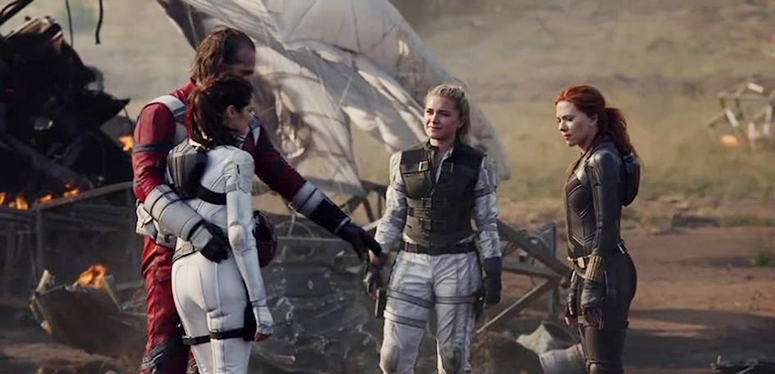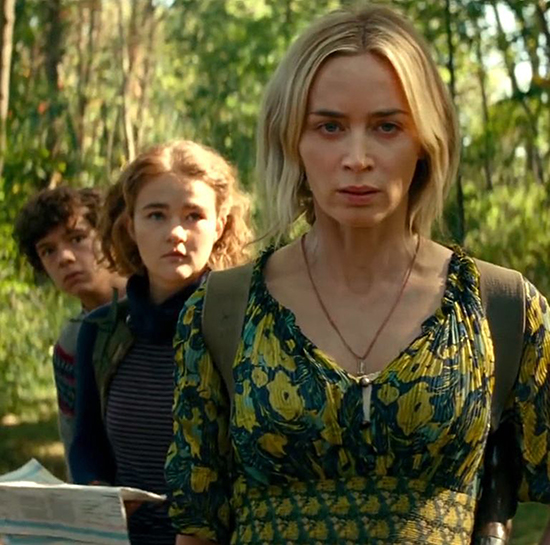‘Black Widow’ and the return of big Hollywood movies
Here in the Philippines, we’re not yet ready to reopen cinemas and flood back into crowded public seats. But Stateside, post-lockdown, Hollywood is dipping its toe into wide releases, testing the waters for bigger box office.
It’s significant, somehow, that movies like Black Widow and A Quiet Place Part II and F9 have finally emerged — movies that would just feel like typical, big, loud, noisy, crashy Hollywood action films prior to 2020, but now feel, a little, like things are getting back to normal, or at least a not-so-quiet place where COVID isn’t even referenced.
Black Widow, which just came out ($159 million in box office so far), somehow feels like a return to Hollywood’s blockbuster ways. Even with small-screen Disney+ offerings (WandaVision, Loki, Falcon and the Winter Soldier) keeping fans satiated during a lingering lockdown, it’s strangely reassuring to see that red Marvel logo splash across a wider screen again.
Pairing Scarlett Johansson and Florence Pugh (Little Women) as Russian sisters raised under a ruthless assassin-training program run by a certain General Dreykov (Ray Winstone), Black Widow positions its titular character somewhere between Avengers: Civil War and Avengers: Infinity War.
Estranged from half of the Avengers, Natasha Romanoff aka Black Widow finally gets her origin story, and it involves undercover Russian agents Rachel Weisz and David Harbour (Stranger Things), sent to raise these little assassin tykes somewhere in Ohio back in 1996. Skip ahead a few decades, and Natasha and sister Yelena (Pugh) meet up again in Budapest, where they decide to track down the maker of a weird red fluid that controls a squad of female killers.

Black Widow is one of the Avengers that people have been dying to see more of, and ScarJo doesn’t disappoint. She’s still got that “don’t-get-too-close” chip on her shoulder, but since we know what eventually happens to Natasha Romanoff (skip ahead to Avengers: Endgame), it just makes those trust and intimacy issues all the more poignant.
The quartet of Johansson, Pugh, Weisz, and especially Harbour as a goofball former superhero who can barely get into his Spandex make their screen time together that also very rare, enjoyable thing: fun at the movies.
Still, it’s a shame that Natasha never really gets to fully enjoy herself, or explore her fun side. It’s mostly mission, mission, mission. That, and searching for a family. Maybe that poignancy is meant to echo the feelings we’ve all felt over the past year, being separated from family and friends by a virulent foe, and not exactly sure when or even whether we could all come together again.
It helps that ScarJo has very good chemistry with Pugh, who was everybody’s least favorite Amy in Little Women. A bratty little sister, but sporting a Villanelle/ Killing Eve Russian accent, Yelena keeps roasting Black Widow for “that thing you do while you’re fighting, where you flip your hair and do like a fighting pose, like you think everyone is looking at you all the time.” Because big sis is a famous Avenger now, you see.
The sister tandem also underlines a pro-women message that not so subtly references everything from #MeToo to Jeffrey Epstein’s horrific web of exploitation. Cate Shortland directs with the patented Marvel look and feel, but it’s an added thrill to see the screen filled with female black-clad assassins, instead of just assassin dudes.
More importantly, the quartet of Johansson, Pugh, Weisz, and especially Harbour as a goofball former superhero who can barely get into his Spandex (think: Soviet Mr. Incredible) make their screen time together that also very rare, enjoyable thing: fun at the movies. It’s the intimate scenes between them that are as worthy as all the high-budget helicopter rescues and kill shots.
The script can be a bit silly at times, and it’s unfortunate that Johansson has to work extra hard to steal scenes from Pugh in her own movie, but otherwise Black Widow feels like that thing we didn’t realize we were missing all this time: a big-screen Marvel movie with Big Action Scenes and sly meta asides left and right.

Another big-screen release testing the early post-COVID box office was John Krasinski’s A Quiet Place Part II, which hauled in $279 million in box office since March.
This sequel follows the Abbott family, now led by Lee (Emily Blunt), who, along with her two teen kids and newborn, try to avoid making any noise whatsoever for 97 minutes lest alien uglies rip them to shreds.
They encounter a cagy Cillian Murphy (wearing baseball cap, natch) who at first wants to turn them away from his hidden bunker beneath a foundry (because newborn baby wailing = certain death) but eventually joins in their mission to fight the aliens.
What makes this a little better than the average alien jump-scare flick is the shared sense of purpose, even if the characters are constantly separated and endangered. The first film’s conceit — that the Abbotts had already learned sign language to communicate with their deaf daughter Regan (an awesome Millicent Simmonds) — bonds them, and eventually draws Murphy into their goal: to broadcast the hearing aid tone that apparently distresses the aliens to pieces.
Also notable is a conclusion that strongly signals that the next generation will be key to our species’ survival. Because, after all, we grownups have made a mess of things on the planet for quite a while already. It’s empowering, even as it panders to Gen Y viewers.
The new wave of blockbusters (most wrapped production before COVID hit but were held back from release) are not without moods steeped in loss, struggle and flickering hope: just like us.
And, just like we’ve been through something that has changed us, movies from now on will probably become a hybrid experience — cinemas slowly reopening, but competing more and more with our home-viewing impulses. We’ve changed, become home-dwellers, and our watching habits have changed, too.
So for Hollywood, it might be too early to call this a comeback just yet. But whether we’re watching on a big screen or a variety of home devices, big movies are starting to re-emerge from their shell again. Just like us.


